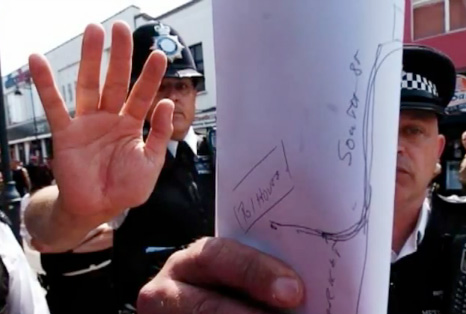| Young photojournalist detained for army cadet pics * |
 |
| Written by Olivier Laurent |
|
On Saturday 26 June, photojournalist Jules Mattsson, who is a minor and was documenting the Armed Forces Day parade in Romford, was questioned and detained by a police officer after taking a photo of young cadets. [Photojournalist Edmond Terakopian met with Mattsson, visit his blog for further details and a photo of the 15-year-old photographer].
According to Mattsson, who spoke to BJP, after taking the photo he was told by a police officer that he would need parental permission for his image. The photographer answered that, legally, he didn't. While he tried to leave the scene to continue shooting, a second officer allegedly grabbed his arm to question him further.
According an audio recording of the incident, the police officer argued, at first, that it was illegal to take photographs of children, before adding that it was illegal to take images of army members, and, finally, of police officers. When asked under what legislation powers he was being stopped, the police officer said that Mattsson presented a threat under anti-terrorism laws. The photographer was pushed down on stairs and detained until the end of the parade and after the intervention of three other photographers.
A spokeswoman, before commenting on the case, questioned, in a conversation with BJP, why Mattsson used an audio recording device, in this case a phone, to record the incident. Asked about it Mattsson says that he started recording only after he was "agressively taken aside by an officer". He also says that it isn't the first time he's been stopped and wanted a record of the incident to prove he wasn't breaching any laws.
The recording can be heard in this YouTube video put together by Mattsson. The photographer was stopped for the fourth image shown in this video.
The spokeswoman for the Metropolitan Police Service has now issued a statement to BJP: "It is clearly not the intention of the MPS to prevent people from taking photographs, although, as the public would expect, officers will remain vigilant, particularly in crowded public places. Any allegations or complaints about police treatment of photographers are taken very seriously by the MPS."
She adds: "Anyone who is unhappy with the actions of individual police officers can make a formal complaint, which will be thoroughly investigated. Although at this time we have not received a complaint about this incident and no allegations of crime have been made, we will investigate the circumstances. Our officers do receive guidance around the issue of photography through briefings and internal communications and we continue to drive this work forward."
Mattsson plans on seeking legal advice. However, it isn't the first time photographers and photojournalists have been stopped from taking pictures in public places. BJP, as well as other press organisations such as Amateur Photographer, have led campaigns to highlight the increasing use of anti-terrorism legislation to stop photographers.
While photographers have been clamoring for years that they are being targetted by over-zealous police officers, the issue only received national interest in December last year when a journalist for The Independent was himself stopped for taking a picture of the House of Parliament.
The incident caused a media blitz, with newspapers such as The Independent, The Daily Telegraph, The Guardian and Daily Mail, as well as the BBC publishing articles on the issue of public photography. Under pressure, the Association of Chief Police Officers sent a memo to all police forces around the country informing them that they 'should not be stopping an searching people for taking photos.' The memo continued: 'There are no powers prohibiting the taking of photographs, film or digital images in a public place.'However, despite reassurances that anti-terrorism powers were not targetting photographers, police officers, since then, have continued to quote the legislation to stop photographer from working in public places. In fact, only a few days following the memo's release, award-winning architectural photographerGrant Smith was detained after taking photos near the Bank of America - Merrill Lynch building.
In January, more than 1000 photographers protested stop-and-search powers in a mass gathering in Trafalgar Square. The protest was soon followed by a statement from the Lord Carlile, the UK's terror watchdog, who called for Section 44 powers to be scrapped - to no avail.
The government was dealt another blow after the European Court of Human Rights found that the anti-terrorism powers were illegal. In its ruling, the court said: "The public nature of the search, with the discomfort of having personal information exposed to public view, might even in certain cases compound the seriousness of the interference because of an element of humiliation and embarrassment."
It added that it was "struck by the statistical and other evidence showing the extent to which police officers resorted to the powers of stop and search under section 44 of the Act and found that there was a clear risk of arbitrariness in granting such broad discretion to the police officer. There was, furthermore, a risk that such a widely framed power could be misused against demonstrators and protestors in breach of Article 10 and/or 11 of the Convention."
Despite the ruling, the previous government appealed the decision. And while the new government haspromised to reform the anti-terrorism legislation, it has yet to do so, arguing that it will wait for the European Court to rule on its appeal.
|





